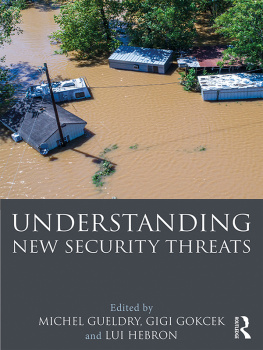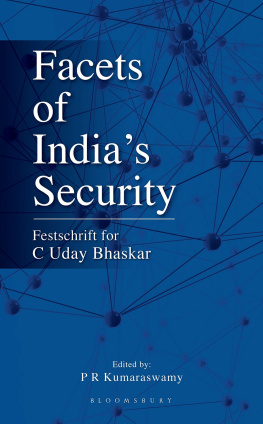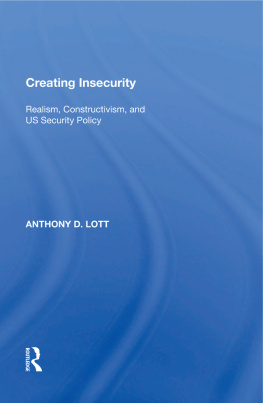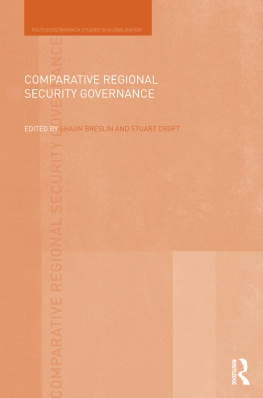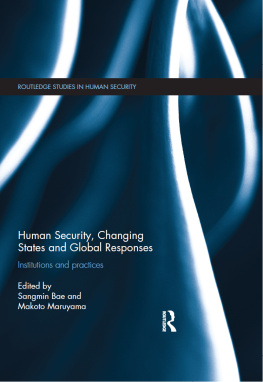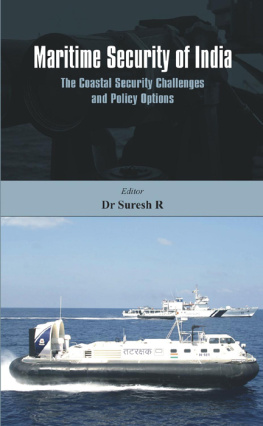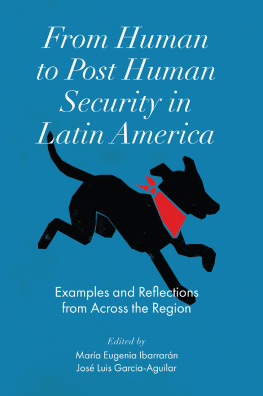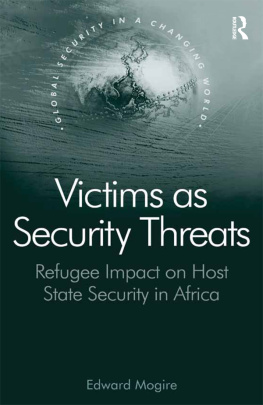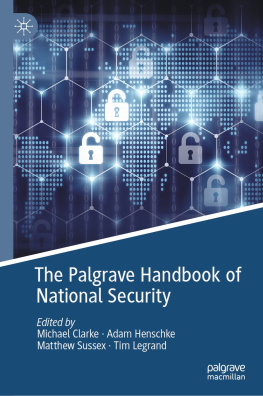A thoughtful, innovative, and ambitious volume with a unique perspective, surprising insights, and inclusive approach to the complexities of global-wide insecurity. In assembling scholars and policymakers at the forefront of non-traditional international security concernsclimate, energy, food, water health, gender, etc.Gueldry, Gokcek, and Hebron have produced a collection of readings that is simultaneously sophisticated and accessible. It is refreshing to find a textbook that challenges long-held assumptions in this way and complements the more state-centered perspectives on international security. Geared to inform students and engage scholars alike, it is a must-read for anyone interested in gaining a more comprehensive and nuanced understanding of international security.
Patrick James, Dornsife Deans Professor of International Relations, University of Southern California, ISA President (20182019)
Understanding New Security Threats is a timely, engaging and accessible volume on the complexity of security in the 21st century. Security is not a simple term and this textbook provides students with an understanding of this issues breadth and its relevance to their world. Gueldry, Gokcek and Hebron assemble an A list line-up of scholars to examine the non-traditional security threats that many students fail to consider when thinking about global security. These authors provide a wonderfully accessible narrative that engages students in the study of these non-traditional threats, while reminding them of the continued relevance of traditional nation-state threats and the interplay between these traditional and non-traditional security concerns. In short, this is the textbook that finally places the notion of security in the complex narrative that is needed for our students.
Eric K. Leonard, Henkel Family Chair in International Affairs, Shenandoah University, VA
A comprehensive look into a multitude of new security threats confronting state and non-state actors today. Each chapter clearly illustrates the connectedness of these non-traditional threats, drawing on an impressive number of the most recent reports and scholarly works. The inclusion of discussion questions makes it especially useful for classes, but the quality of the analyses readily contribute to the growing scholarly dialogue around issues of human security as well. This outstanding volume is engaging, insightful, and accessible to a wide audience.
Carolyn M. Shaw, Wichita State University, KS
Gueldry, Gokcek, and Hebron have assembled a fascinating set of readings elevating the discussion of non-traditional areas of security. In fact, they successfully make the case that these topics are the new normal for those interested in exploring the present and not-too-distant future of security. While climate change, food security, water security and energy security are currently occupying the minds of scholars and policymakers, the authors in this volume push us one step further to think about geoengineering, STEM transformations, and populism and security. This volume is a much-needed and timely addition to our thinking about security in an increasingly fragmented world.
Cameron G. Thies, Arizona State University, ISA President (20192020)
Understanding New Security Threats
This textbook examines non-traditional forms of security and expands the notion of security to include non-state actors and non-human actors.
Proposing an expansive view of non-traditional forms of security that go beyond traditionally recognized issues of threats to state and national territory, this new textbook rests on the following premises:
- traditional state-centered threats, such as nuclear proliferation and espionage, remain a concern;
- old and new threats combine and create interlocking puzzlesa feature of wicked problems and wicked messes;
- because of the global erosion of borders, new developments of unconventional insecurity interact in ways that frustrate traditional conceptual definitions, conceptual maps, and national policies;
- unconventional security challenges which have traditionally been seen as low politics or soft issues are now being recognized as hard security challenges in the twenty-first century;
- many of the so-called new threats detailed here are in fact very old: diseases, gender violence, food insecurity, under-development, and crime are all traditional security threats, but deeply modified today by globalization.
The chapters offer local and global examples and engage with various theoretical approaches to help readers see the bigger picture. Solutions are also suggested to these problems. Each chapter contains discussion questions to help readers understand the key points and facilitate class discussion.
This book will be of great interest to students of international security studies, human security, global politics, and international relations.
Michel Gueldry is Professor of International Relations and Sustainability Studies at Middlebury Institute of International Studies, USA.
Gigi Gokcek is Associate Professor of Political Science at Dominican University, USA.
Lui Hebron is an Academic Coach at Instructional Connections, USA.
First published 2019
by Routledge
2 Park Square, Milton Park, Abingdon, Oxon OX14 4RN
and by Routledge
52 Vanderbilt Avenue, New York, NY 10017
Routledge is an imprint of the Taylor & Francis Group, an informa business
2019 selection and editorial matter, Michel Gueldry, Gigi Gokcek and Lui Hebron; individual chapters, the contributors
The right of Michel Gueldry, Gigi Gokcek and Lui Hebron to be identified as the authors of the editorial material, and of the authors for their individual chapters, has been asserted in accordance with sections 77 and 78 of the Copyright, Designs and Patents Act 1988.
All rights reserved. No part of this book may be reprinted or reproduced or utilised in any form or by any electronic, mechanical, or other means, now known or hereafter invented, including photocopying and recording, or in any information storage or retrieval system, without permission in writing from the publishers.
Trademark notice: Product or corporate names may be trademarks or registered trademarks, and are used only for identification and explanation without intent to infringe.
British Library Cataloguing in Publication Data
A catalogue record for this book is available from the British Library
Library of Congress Cataloging-in-Publication Data
Names: Gueldry, Michel R., editor. | Gokcek, Gigi, editor. | Hebron, Lui, editor.
Title: Understanding new security threats / edited by Michel Gueldry, Gigi Gokcek and Lui Hebron.
Description: Abingdon, Oxon ; New York, NY : Routledge, 2019. | Includes bibliographical references and index.
Identifiers: LCCN 2018050833 (print) | LCCN 2019000100 (ebook) | ISBN 9781351590945 (Web PDF) | ISBN 9781351590938 (ePub) | ISBN 9781351590921 (Mobi) | ISBN 9781138104723 (hb) | ISBN 9781138104747 (pbk) | ISBN 9781315102061 (ebk)
Subjects: LCSH: Security, International. | National security. | Human security. | Energy security. | Biosecurity. | Computer security. | Non-state actors (International relations) | Terrorism--Prevention.
Classification: LCC JZ5588 (ebook) | LCC JZ5588 .U53 2019 (print) | DDC 355/.033--dc23
LC record available at https://lccn.loc.gov/2018050833
ISBN: 978-1-138-10472-3 (hbk)
ISBN: 978-1-138-10474-7 (pbk)
ISBN: 978-1-315-10206-1 (ebk)

